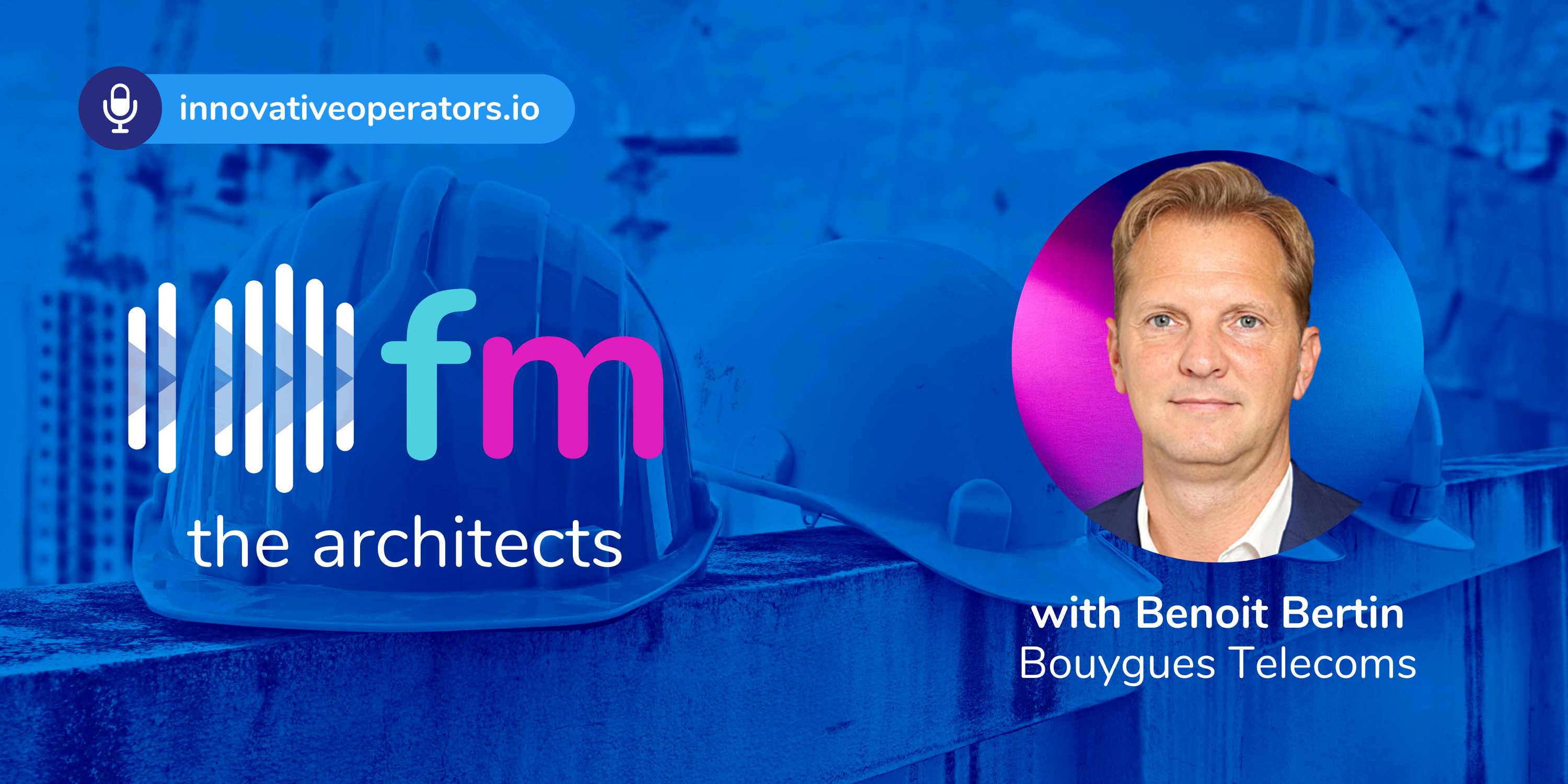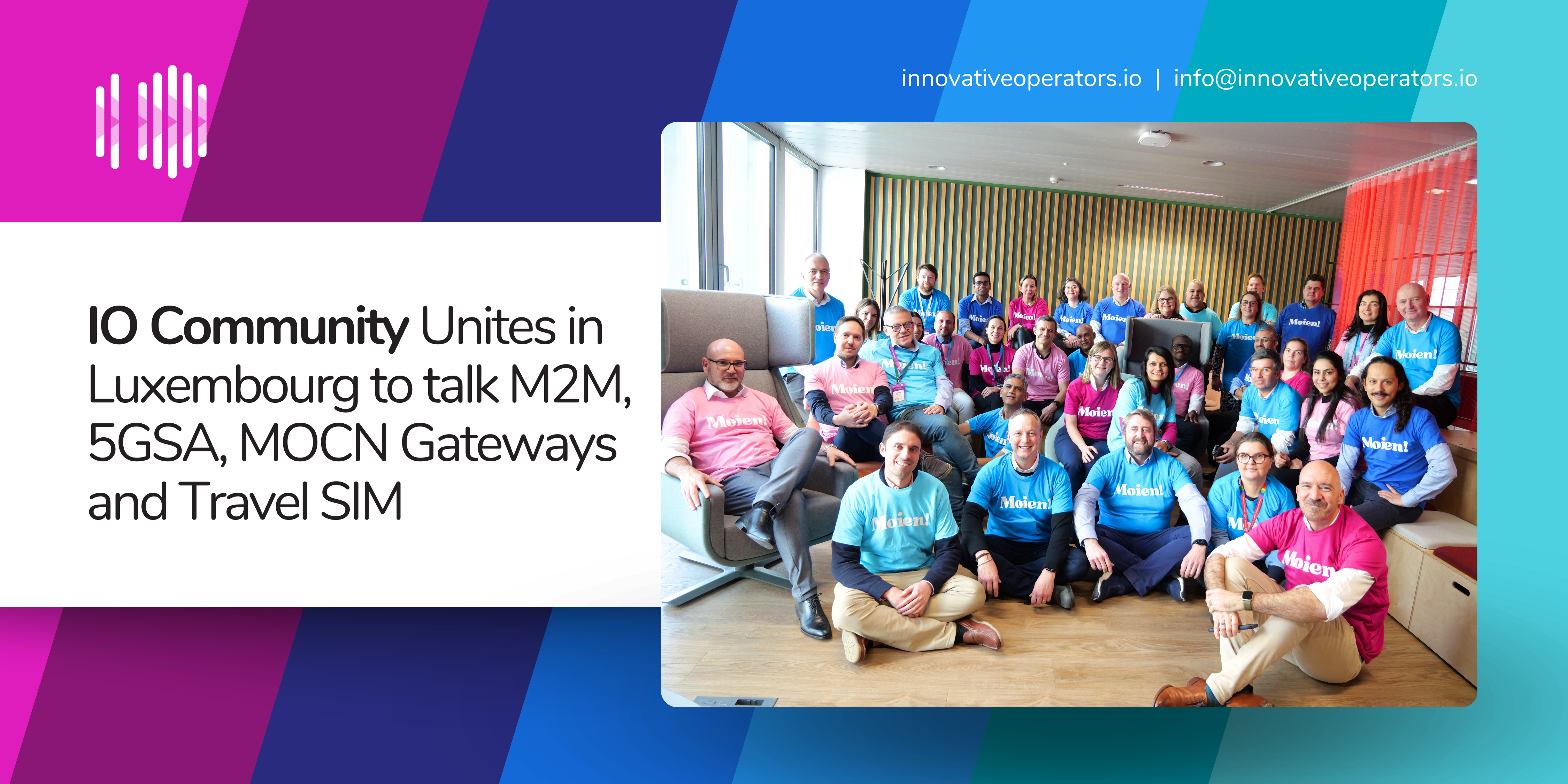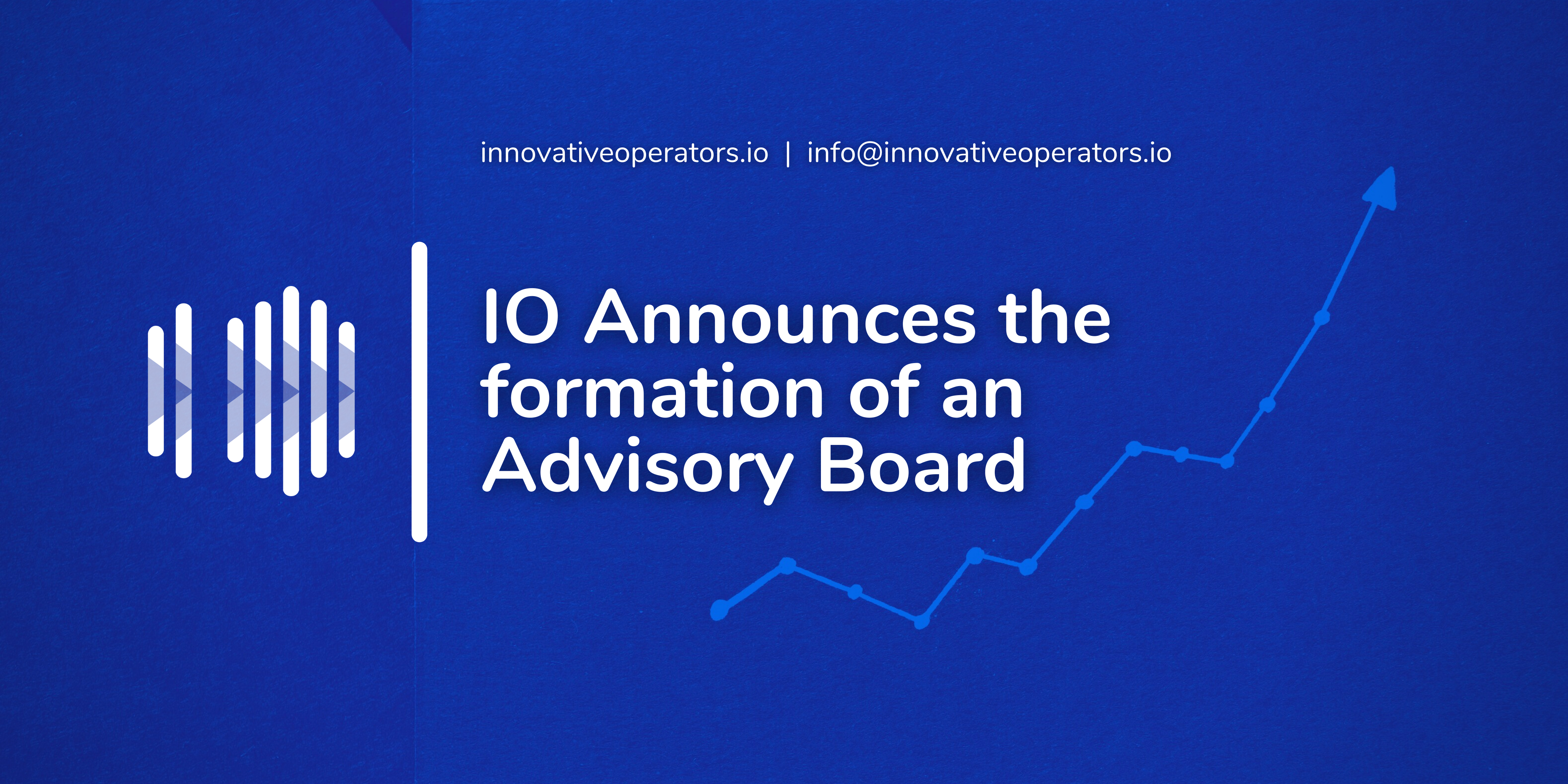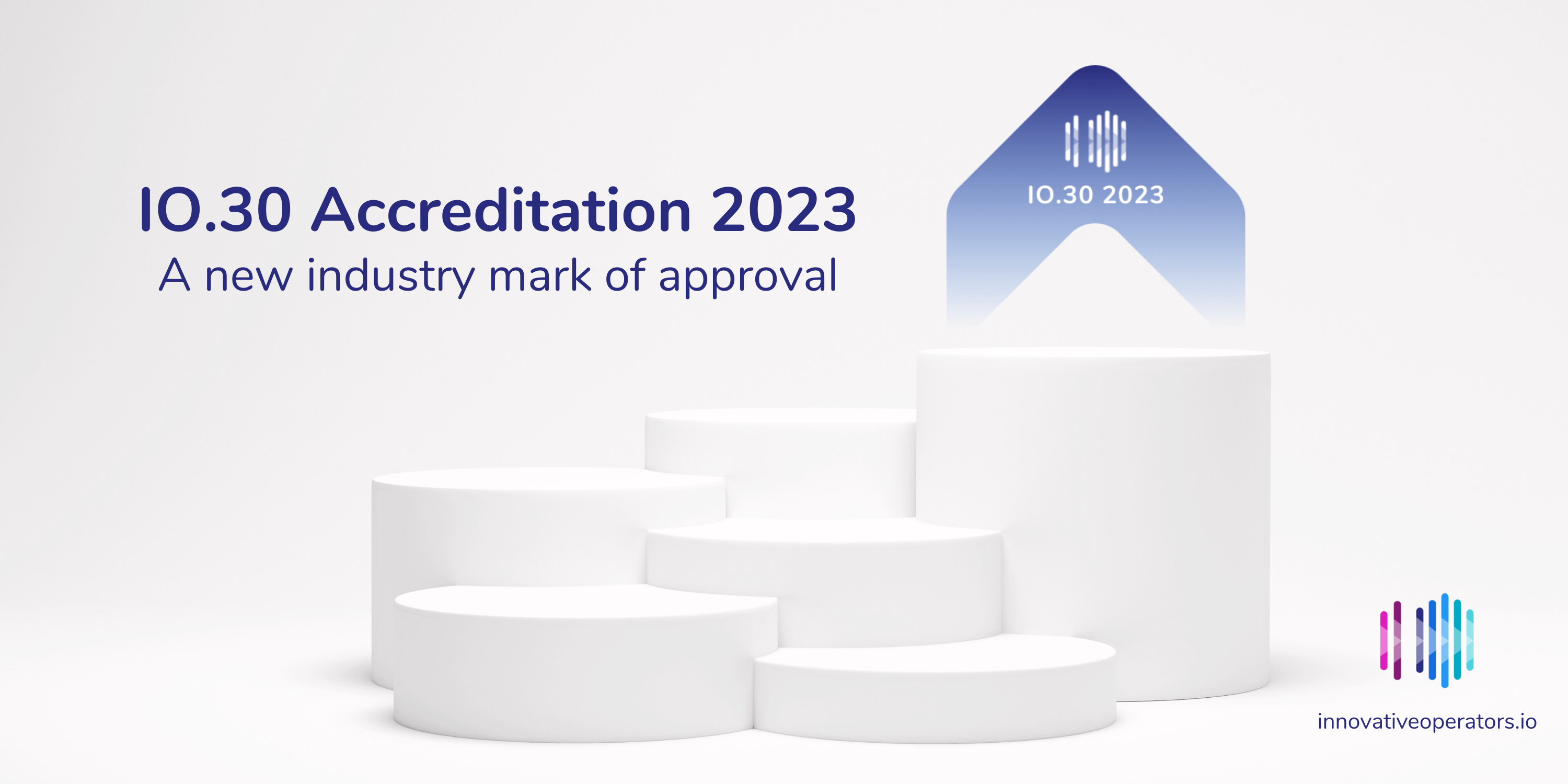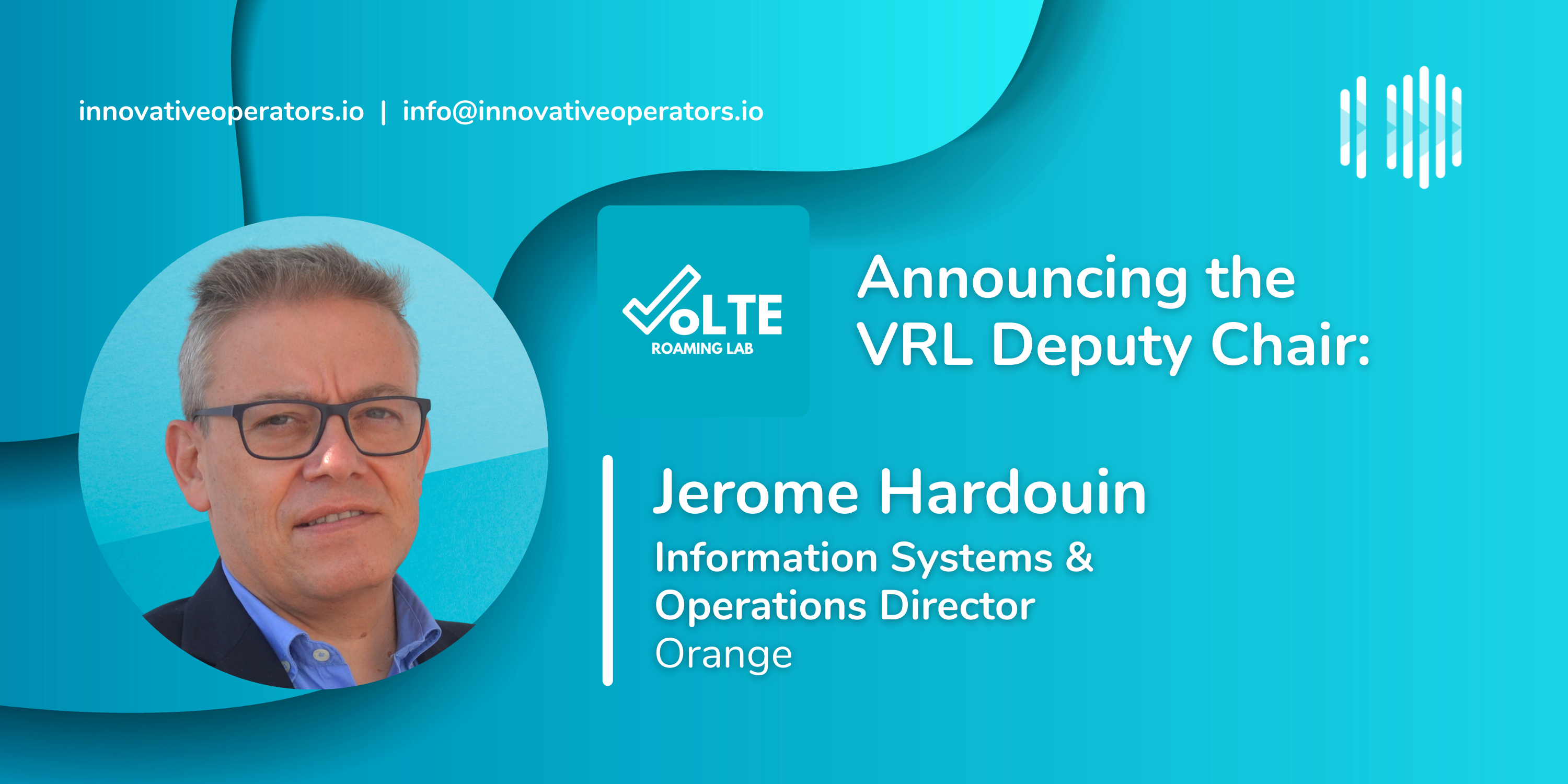IO FM The Architects: Benoit Bertin from Bouygues Telecom
Introducing IO FM
IO FM is our new radio channel in which we are going to keep a record of the building of IO. In our The Architects series, we interview the MNOs and industry experts who are helping with the building of IO, designing a sound structure to support the work the Labs are developing. Don’t forget to subscribe to our newsletter to be informed of our podcasts releases.
The Podcast Transcript
This is an edited version of the IO FM The Architects: Benoit Bertin from Bouygues Telecom.
I can perfectly understand that there is a big difference between the initial phase, in which you can define all that you want to do, it gives you a good indication, a good view, but when it comes to the reality, okay now let’s do it… you can see it’s a different way of thinking and way of doing, and the timing is very different as well. IO will be for me the perfect association to try to set up a search collaborative space between operators.
Benoit Bertin
Dhiraj Wazir:
Benoit, thank you for joining us today. What’s your current role in Bouygues telecom now?
Benoit Bertin:
I’m in charge of roaming, deploying and maintaining services, and then all the negotiation to buy for the retail business line. And, of course, to welcome people on my network as well. At the end of the day, of course, my management, they expect from me that all the service work perfectly. And then about finance, of course, can be judged on my net position globally speaking. So it’s a combination of technicals things and commercial things. For International, I have to deliver the goods voice service to our customer, to manage incoming voice call termination market within Bouygues Telecoms, and to buy services like IPX signalling to make it work. So have to find my own providers and I have to develop interconnection with them and make it work.
Dhiraj Wazir:
Well that’s that’s quite a broad role, and quite challenging at times. So you’ve been in the telecom industry for a while now. Can you tell us a little bit more about your journey into telecoms, how it started, how you got where you are today?
Benoit Bertin:
I started in the industry 25 years ago, joining Bouygues Telecom since the beginning. I was still a student when I decided to join the company. I started at the beginning, deploying antennas on over the network for for few years, being involved in really technical stuff. And then after five or six years, I was proposed something different in interconnection tools, that was a great challenge for me. I joined the team in 2000, I worked in moving into the interconnection department for many, many years, at least five or six being in charge of resources management, how to manage signalling, numbering of things like that, and in charge as well of with very specific project like mobile number portability, how to deal with over the regulator and other operators in France. And then I decided to change a little bit and I was then in charge of all the project management part for the wholesale activity.
So to define every year, I will say the strategic view of our department, all the project portfolio, and then to ask for budget, and then to launch all the project with IT and the network teams to make it happen. So that was a really interesting and then, I guess seven or eight years ago, I was proposed the Roaming manager position. So for me, it was a great opportunity because at that time, I could develop commercial skills, additionally to all the technical, and project management skills. So it was very interesting and I was very happy. And then two years later, I’ve been given all the international Wholesale stuff, international voice market, IPX signalling. But this is globally, my journey within Bouygues Telecom. It’s a very long journey, and it’s still an ongoing journey.
Dhiraj Wazir:
Yes. I can just imagine it’s amazing. And how you would have seen in the last 25 years Bouygues transform and also, you know, telecoms. Does the industry feel very different to you than when you started 25 years ago?
Benoit Bertin:
Yeah, it’s really, really different than the beginning. You know, it was like a startup. I mean, when I entered the company we were around 200 people and now we are around 9000. Telecommunications 25 years ago I would say it was a fantastic new business, and with so much money to produce. And then 25 years later, it’s not exactly the same story. We are still a profit making industry for sure, with very high competition, that we can see the consequences everyday where for example, the regulation or roaming and now on interconnection.
When you see all the investments still to be done in favour of next generation with 5G, we are working everyday, really on the edge, you have to produce a lot for your main shareholders, but you have to invest a lot with low price, I had the chance to start seeing the beginnings to see all the all the evolution of search industry. And it is going to be funny for the next coming months and years. Because I’ve never seen so many disruptive things in approach for me, there is going to be really challenging. My feeling is that I don’t know any other industries in which you can have so many evolutions in only 20 years. I started with the first generation in less than 20 years, we have the 2G, 3G, 4G, 5G, IoT… and it’s fantastic when you think about that, you can’t be bored in this industry.
Dhiraj Wazir:
Yeah, so absolutely. I have great respect for people who are engineers, people who come from that background, I’ve personally experienced that the way they think, the way they analyze things is very different, you approached things very scientifically. In your own career, do you think that coming from that technical background as an engineer has helped you look at things slightly differently? For example, if a purely commercial person comes in, how does that technical background help you?
Benoit Bertin:
It helps in the sense that, even if we can spend great time in our job in a commercial distribution, it helps you have a good view of the cost production basis and how it works specifically and what are the technical challenges in front of your commercial challenges. It helped because I can perfectly understand why sometimes you can say yes to specific commercial fails in explaining to people. Do you know exactly how much does it cost? Do you know how exactly how complex it is to set up?
What’s important as well, it can give you a good insight on the pricing model, and it helps you in earning a good view of what’s the real value and what could be the sustainable value for the market. I’m in charge of all the commercial aspects, but in charge as well of technical so I’m still in the technical stuff because I’m in charge of deploying all the new services as well.
Dhiraj Wazir:
What would you say is your biggest industry challenge that you’re currently facing?
Benoit Bertin:
Obviously, at that time, the first one I shared with everyone is, is to manage the impact of the COVID crisis. For sure, because it has been so disruptive on the market. But it has it has been disruptive without any trends for the future. One year ago we all hoped at that time that it would last only one year, but no more. Now we can see that it’s gonna last a while. It’s very difficult to understand how we should change our position, should we change? Or is it better to stay on and to work the way we used to do so far, it’s very complicated to analyze and to have a good insight of what’s going to be like in the next few months. So yes, this is my main challenge.
On top of that, what we can observe is that in the next coming years, we will have to prepare a huge technical evolution, that is the shift towards an all IP world. As I mentioned, we are in an industry in which the pressure about cost reduction is very high. So we all know that we will have to do it in a very efficient way. And probably it won’t be possible to maintain, you know, all kinds of technologies. So we will have to make choices and we will have to manage that transition. I guess that, more or less, having a new 5G Core Network and things like that, I will be asked to develop and manage the transition and stop as soon as possible the traditional CS technology, like 2G and 3G.
We have disruptive things coming, and we have to manage COVID at the same time, is is going to be a great challenge because we have to do it in a very efficient way. When I take a look at the resources needed for that… it’s gonna be interesting. To be honest, at that time when I saw how difficult it is for example to deploy VoLTE I said yes, we will have to deploy VoLTE, then we will have to deal with 5G, especially 5G Core Network and Standalone 5G, introducing slicing stuff that was going to be funny, and then we have to support the fantastic growth of M2M and IoT world, offering for sure many new offers and new products. Dealing with permanent roaming situation, we know that we have to simplify a lot of the current processes about charging and billing to be done with BCE. So we have so many things today in a very short time, it’s going to be really challenging.
Dhiraj Wazir:
With all these changes happening with COVID and the pressure that it has put on business, do you think overall the importance of roaming in telecoms has gone down? Or do you think it is still going to be important for us in the future so it’s worth taking all this pain and carrying on?
Benoit Bertin:
I think of course in the last year with COVID, yes, we could think that roaming was not so important. But I mean it has been a disaster of most of operator because if you take a look at the impact on the on the revenues of all operators, it has been quite huge. Now, for me, roaming is still important and it will be as important as it used to be. It is true that there are no so many travellers, but they will be back again for sure. So it’s not a problem with globalization, we will be asked in the future to be more efficient on roaming services, especially with a private data coming with 5G, with machine to machine. Roaming still has to be developed and it will be still a significant part of job for every paradigm in the world, but it’s complicated.
Dhiraj Wazir:
I mean, just looking at where you’re coming from in terms of how you built your career, the level of experience that you’ve had, a very important role that you hold in Bouygues right now, where do you think IO comes into the picture? Where do you think IO can help?
Benoit Bertin:
IO… is it redundant with the GSMA? Or is it a substitute to the GSMA workgroups? For me GSMA is very important and will remain important. For all the main guidelines and the framework we should work with them. You define globally some things through PRDs. Of course, it looks not so efficient sometimes. But it’s because it has not been designed to work in a very operational phase. And it’s where IO could help a lot. When it comes to more implementation phase, very operational phase, generally, you have to deal with reality and unexpected issues. And then, in that kind of situation, you need a reactivity, responsiveness, you need quick answers. And of course, the way the work group has been designed within GSMA, it is not designed for that. So it’s why IO, for me, could be a good way to help. For me, the the concept of lab, which was introduced through IO, sums up perfectly the concept of what we want to do for IO. We want to try to collaborate more in a more operational phase regarding different issues. Obviously, we learn by doing, everyone is more efficient when we do things together.
For me, it’s quite natural, because coming from my former position, being in charge of all project implementation, I can perfectly understand that there is a big difference between the initial phase, in which you can define all that you want to do, it gives you a good indication, a good view, but when it comes to the reality, okay now let’s do it… you can see it’s a different way of thinking and way of doing, and the timing is very different as well. IO will be for me the perfect association to try to set up a search collaborative space between operators. That’s why, for me, it doesn’t bring any conflict with the GSMA at all. We will have to work with GSMA at the end to make sure that everything that should have been discussed before has been well defined. And in case we can face some issues and problem, either we should find some solution together, or we should come back to the GMSA to reopen the discussion again. Because either we will be all aligned or it’s gonna be a disaster, a big mess on that kind of topics. I know it it’s easier said than done. Of course.
Thank you for the initiative, because I think it is really worth doing that for any kind of operator, the biggest and the smallest ones. It’s a fantastic opportunity to learn a lot through other operators. First, we have to build everything, we are here to make it happen, to deliver some services to people and this is the first step to create value. If we spent too much time working separately, and then we find some common solution, we will have lost so much energy, rather than moving faster and then creating new opportunities for business.
Dhiraj Wazir:
In light of what you mentioned, so many challenges that we have to face for the first time, and all of them together. How do you think we can do in IO? How can we do things differently? What needs to be different?
Benoit Bertin:
The key success factor for me are, we have to keep it simple and very pragmatic. But what’s really important is then to share what can be learned with others. To say… okay guys, we don’t want to create a very exclusive private group, it’s not the aim. It is very important to share our experience, and then to serve the industry the right way to make it happen. What’s really, really important is to define which will be the right order to move forward. And in that in that way, I think it’s going to be very powerful, because that’s the problem we have with GSMA work groups. We define framework only, we don’t define any timing. And sometimes I have to develop some things, but how and what could be the best way? The order is very important. I mean, everything has been defined through different PRDs. Once you want to start with that, you can see that nobody is ready. Manufacturers… no solution about testing. Okay, so if we can together define the priorities to steer the industry to be to be ready with relevant planning, that will be fantastic.
Dhiraj Wazir:
One last question for me would be… so you’ve obviously been part of the VoLTE Roaming Lab now, and you’ve had great inputs. And you know, you’ve had other people from your organisation, Frank, as well has been joining. And I think the whole group has learned a lot about the specific issues you face in France with the regulator, but for Bouygues as such, what what value do you think VoLTE Roaming Lab added for you? Where did you benefit?
Benoit Bertin:
When we started working on that, we faced so many, many different issues that we started thinking at that time, either we are completing dum, or we’ve lost something, or we missed something, but it’s not possible. I mean, it was one of the most complex project, maybe we missed something, maybe we were wrong. When we started sharing information through VoLTE Roaming Taskforce, and I could observe it was exactly the same pain for everybody I said, okay, it doesn’t come from our internal team. At that time, we could see that we were facing exactly the same problems. Maybe we could talk together and find together some solution. I feel better now. I feel more comfortable when I can see that it’s exactly the same story for very big American operators. Okay, so even for you, it’s not so easy.
It was really interesting to see what kind of approach for example American people could have on that stuff. It was a great surprise for us to see how fast they want to move on VoLTE, because for them, we realised it was a really a big achievement. It was a strategy project for them. We didn’t have the right perception of the importance of VoLTE Roaming for them. It was it was very interesting. It was really, really fantastic. And then to take the opportunity to influence, for example, to ask Apple to move a little bit more on that stuff as well. What’s needed within Bouygues Telecom is that we need to be really efficient, given the size of our company. We try to anticipate a lot, but sometimes it’s really difficult to anticipate when you’re alone and when you don’t have any partners to play with. So in that sense, it was really efficient for us. And all the guys, for example, Frank is very happy to have joined the VoLTE Roaming Lab. He just started to reach as well 5G stuff, with all the new issues with the same context. So we can see that it really makes sense. It’s really efficient.
Dhiraj Wazir:
Thank you Benoit. This has been absolutely amazing for me to talk to you. Because there are so many insights that you come to when you take a step back from you and understanding where you came from and your career, how you build that and degree of experience that you have. And the way that you’re looking at the industry, the challenges that you look at and the opportunities that you see, it’s been really really insightful. For me personally, I’m sure people who who will be listening to this podcast will find it very, very valuable. So I do really appreciate the time you have taken out to kindly talk to us and obviously educate the rest of the people in the industry about the challenges that are coming and how we can go about solving them. So once again, thank you very much for doing this. Thank you.
Benoit Bertin:
Thank you, Dhiraj.

